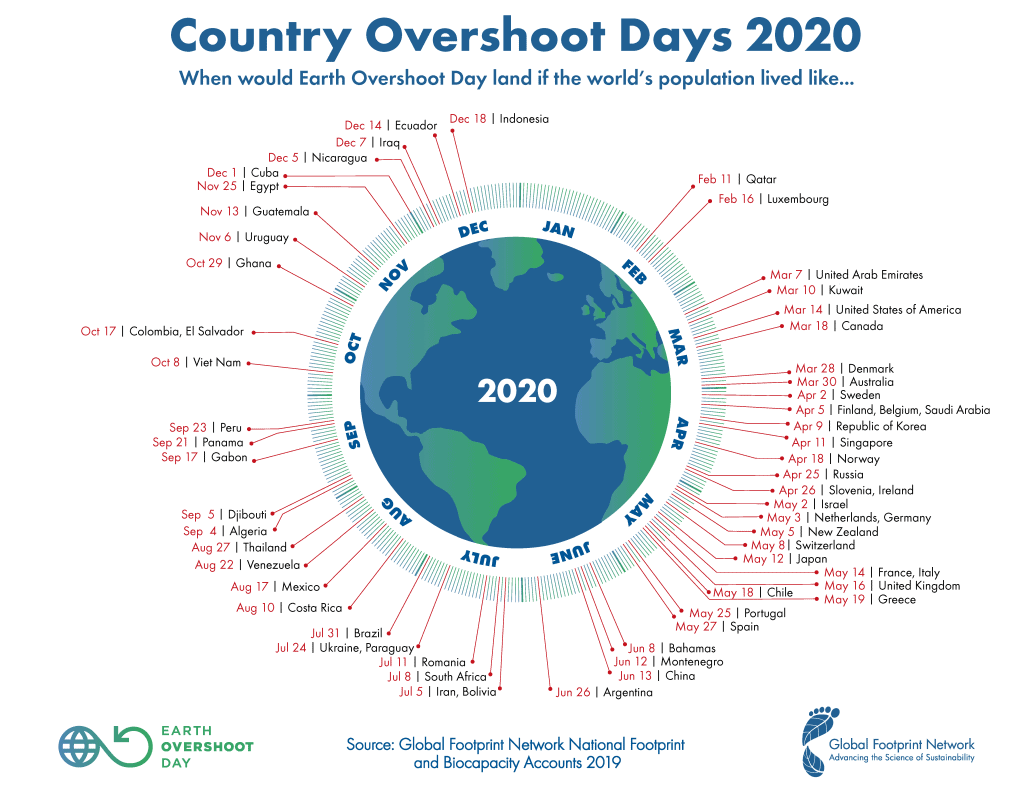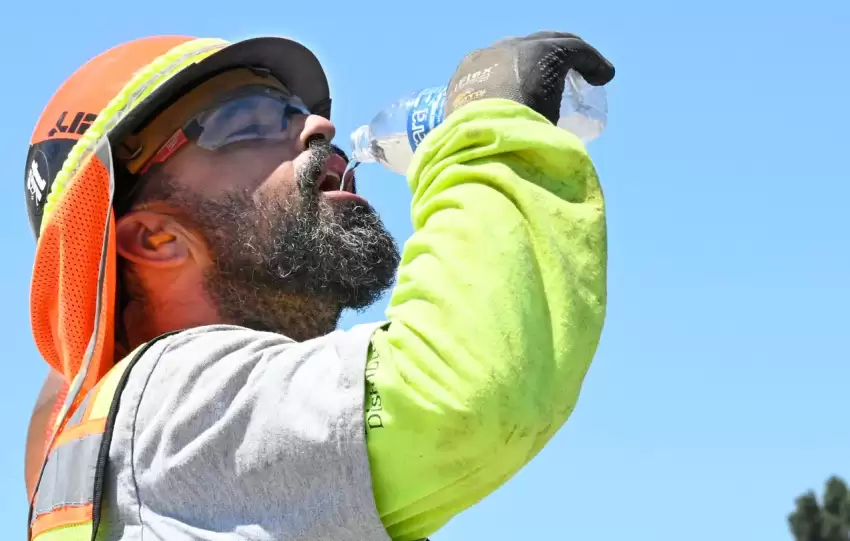August 22 marks Earth Overshoot Day 2020. Never heard of Earth Overshoot Day before? It marks the date when humanity’s demand for ecological resources and services in a given year exceeds what Earth can regenerate in that year. Which means that from August 22 on, whatever resources we use for the rest of the year is stolen from future generations. Let’s talk about that…
WHAT IS “EARTH OVERSHOOT DAY”?
Basically, it marks the date when humans use more than what the Earth can regenerate within the year. Calculated by Global Footprint Network, an international research organisation that thinks about all things ecological limits, this date is determined by dividing the planet’s biocapacity (the amount of ecological resources Earth is able to generate that year) by humanity’s Ecological Footprint (humanity’s demand for that year) and multiplying it by 365 (the number of days in a year).
To be more specific: “biocapacity” represents biologically productive land and sea area, including forest lands, grazing lands, cropland, fishing ground and built-up land. “Ecological Footprint”—more on this later—measures humanity’s demand for food, forest products, space for urban infrastructure, forest to absorb its emissions, etc. Now that you have a better idea of how Earth Overshoot Day is calculated, let’s talk about this year’s date.
EARTH OVERSHOOT DAY 2020
We’ll zoom out for a minute first, and talk globally. The research team from Global Footprint Network concluded a 9.3% reduction in the global Ecological Footprint compared to the same period last year. Sounds good, right? Not so fast. If you haven’t realised, we’re in the middle of a global pandemic. And so, as Chief Executive Laurel Hanscom noted: “The fact that Earth Overshoot Day is later this year is a reflection of a lot of suffering, and the reflection of imposed changes to our lives. I don’t think there’s a silver lining to that.”
“One way or another,” Hanscom added, “humanity will come into balance with the Earth. We don’t want it to be through disaster. We want it to be through intentional, designed efforts to make sure it doesn’t come at such a high and terrible human cost.” Celebrating Earth Overshoot Day 2020 because it comes later than last year is, frankly, rather eco-fascist. Which is a fancy way of saying: if your climate solution reads like population control and/or deaths within vulnerable communities, you should really re-evaluate what you’re proposing.
WE’RE NOT ALL EQUALLY RESPONSIBLE
Speaking of eco-fascism… Something important to remember here is that not all countries are equally responsible for Earth Overshoot Day being on August 22. Here’s a diagram that helps to visualise this:

You might not entirely agree with the methodology, but that doesn’t mean that these aren’t good indicators. Check out what countries have Overshoot Days within the first four months of the year: Luxembourg, USA, Canada, Denmark, Australia and (yes, even) Singapore. Just to give you an idea of what this actually means: if the rest of humanity lived like Luxembourg, we’d need eight planets to make that level of consumption sustainable. And remember: how many planets do we have?
This should draw our attention to another important statistic that often comes up in our—but not always in mainstream—discussions of consumption. The world’s top 10% of income-earners are responsible for between 25-43% of environmental impact. (That’s a quarter to almost-half!) Meanwhile, the world’s bottom 10%? Only 3-5%. The footprint of affluent folks will always be much higher than that of poorer folks. And, of course, that the latter are folks who will be disproportionately affected by the climate crisis.
(PS: we won’t go into this today but let’s also not forget that we found out way back in 2017 that just 100 companies responsible for 71% of global emissions. And where does “carbon footprint” originate from?)
https://www.instagram.com/p/CERf9zTH4s4/
LET’S TALK SOLUTIONS
So: not all of us are equally responsible. This understanding should translate to our solutions too. Global Footprint Network highlights, and we agree, that to #MoveTheDate, we’ve got to look at both individual and collective choices. It looks at five key areas: planet, cities, energy, food and population. Looking at “planet” begs the question: If Earth was a spaceship, how would you manage its life-support system? This system, of course, refers to nature. It gives us life, but on its own, we believe it has intrinsic value too. How do we move towards an economic system that accounts for this?
Looking at “cities” means reminding ourselves of the fact that between 70-80% of humanity will be living in urban areas by 2050. How do we move towards development strategies that take into account ecological footprint? And let’s not forget that talking about development opens its own can of worms—what kind of development? Who is benefiting? Closely tied to these concerns are looking at the key areas of “energy” and “food”. How do we build better systems to support humanity, without compromising sustainability and ethics?
And finally: the elephant in the room. “Population”. It’s worth taking a look at the Global Footprint Network page to get an idea of how to navigate the conversation around it. Certainly, we have to talk about it, but saying “we need to have fewer people on the planet” is a cop-out. (It’s also kind of a myth.)
#LITTLEGREENSTEPS
So how do we #MoveTheDate? First, as mentioned above, we need to keep in mind systemic solutions alongside individual ones (speaking of which, check out our Take Action page). Meaning: every time you think of an individual step to reduce your footprint, think about how to make that step financially accessible and/or about the structures in society that make the sustainable option not viable.
As always, education is the first step: learn about the Ecological Footprint and its related concepts. (Think degrowth, doughnut economy, limits to growth, etc.) Introduce it to people around you, businesses you’re connected to, representatives in your area. Impacting key decision-makers is the essential actionable after educating yourself and your community.
Something useful to keep in mind when thinking about #LittleGreenSteps for moving the date of Earth Overshoot Day is this: who is driving the solutions? There are communities around the world who have been developing solutions in line with moving the date for far longer than we have. Think Indigenous communities, frontline communities, communities of resistance, and more.
https://www.instagram.com/p/CEMqAANpxKy/
PS: speaking of footprints… Green Is The New Black is holding its first-ever #GITNBTalks! We’ll dive into the topic of why your carbon footprint matters, with four industry experts, from both consumer and business perspectives! And in an exclusive launch, attendees will also get a first glimpse of our shiny new GITNB Carbon Footprint Calculator created in partnership with Handprint. Sign up here.
Featured image credits: New York Public Library on Unsplash


